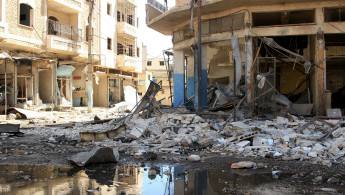Syria death toll 'exceeds 220,000'
Over 20 people, including children, have been killed in Syria, Thursday as clashes continue in parts of the country, with a new report counting the death toll at 220,000 since the start of the conflict.
At least eight were killed, including four children, after barrel bombs were dropped on the town of Taftanaz in the Idlib Province, the Syrian Observatory for Human Rights (SOHR) reported, adding that the death toll is expected to rise as some have been 'seriously wounded.'
Based in Britain, the Observatory uses a broad network of sources on the ground in Syria to gather information about the conflict.
The monitoring group also reported that an aerial bombardment on the neighbourhood of al-Sekkari in the south of Aleppo, killed four men, including a man and his two children.
In Damascus violent clashes continue to take place, the group said, adding that a regime shelling on the town of Zebdin killed 10 people, including five children.
Al-Araby al-Jadeed cannot independently verify SOHR's reports.
Rising death toll
SOHR on Thursday put the number of those who have died in Syria at around 222,271 since the start of the uprising.
The head of the Syrian Observatory for Human Rights, Rami Abdel Rahman, told AFP that more than 67,000 of the dead were civilians, including more than 11,000 children.
Among dead combatants, nearly 47,000 were from pro-regime forces, including more than 3,000 foreign fighters.
Nearly 700 were fighters with Lebanon's Hezbollah movement and around 40,000 anti-regime fighters and about 28,000 foreign fighters have also been killed in the conflict, the Observatory added.
However, the toll does not include some 20,000 people listed as missing.
The Observatory says the full death toll is likely to be much higher than the deaths it has been able to count.
The UN also puts figures at more than 200,000 people, adding that nine million others have been forced from their homes.
Chemical weapons discussion
The UN Security Council was due to discuss chemical weapons in Syria on Thursday, as evidence mounts that the Damascus regime dropped chlorine-filled barrel bombs on civilians last month.
After conducting inquiries into six attacks, Human Rights Watch (HRW) have concluded that there was a "strong evidence" of chemical weapon use by the Syrian regime in Idlib during 16-31 March 2015.
The attacks were carried out on villages and towns captured by rebels in the battle to take the city of Idlib, the human rights group stated.
HRW collected evidence including photos, videos and eye witness statements which they said points to use of chemical weapons in at least three attacks, and three others warrant follow up enquires.
This is not the first time the use of chemical agents has come up in Syria's conflict, with reports suggesting that throughout 2013, 2014 and into 2015, the government has made liberal use of barrel bombs, including chemical agents, "likely chlorine".
Yarmouk battle continues
Local fighters in the Yarmouk Palestinian refugee camp in Damascus advanced Wednesday in clashes with Islamic State militants two weeks after the extremist group stormed the area in its deepest foray into the Syrian capital, a Palestinian official and an activist said.
Damascus-based Palestinian official Khaled Abdul-Majid said that Palestinian factions have forced the IS fighters to retreat from some positions in Yarmouk camp.
Sami Hamzawi, a Palestinian activist from the camp who currently lives outside Syria, said the Hamas-affiliated Aknaf Beit al-Maqdis group has captured several buildings and is currently advancing from areas it holds northeast of Yarmouk. Hamzawi said he is in regular contact with camp residents.
Islamic State fighters overran much of Yarmouk earlier this month, establishing a foothold in the Syrian capital for the first time.
Palestinian and Syrian officials have vowed to retake Yarmouk, a built-up area that housed 160,000 Palestinians and Syrians before the civil war.





 Follow the Middle East's top stories in English at The New Arab on Google News
Follow the Middle East's top stories in English at The New Arab on Google News


